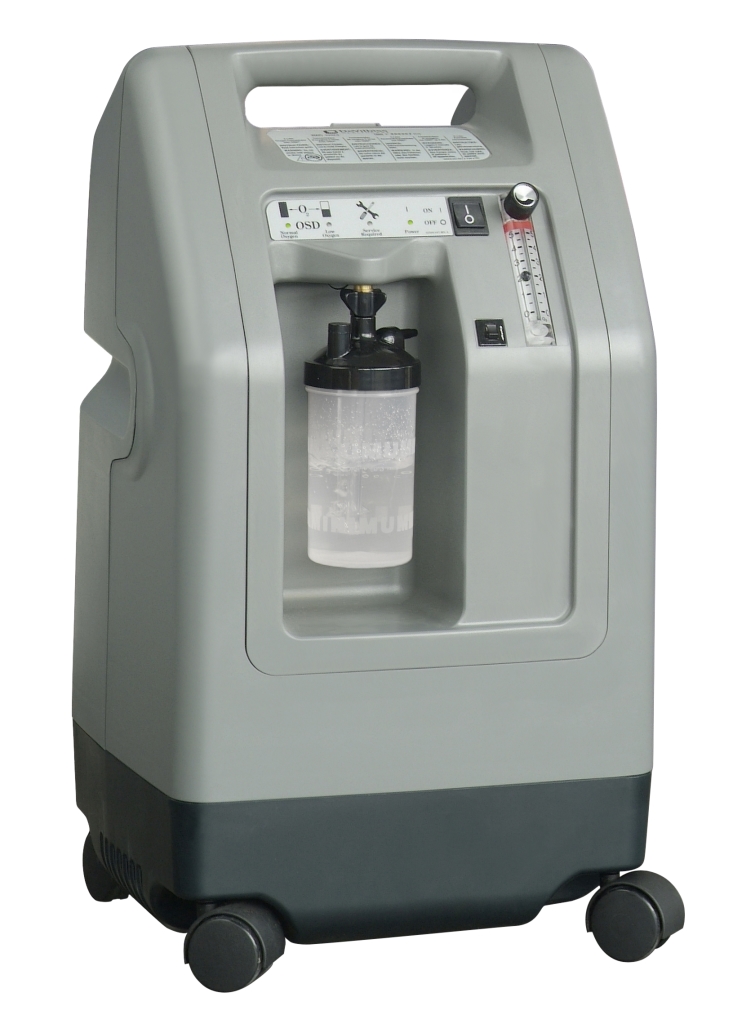CONCENTRATOR O2 (DeVilbiss 525KS) 5l, 220V + access.
Valid Article
CONCENTRATOR O2 (DeVilbiss 525KS) 5l
Definition
A stationary mains electricity (AC-powered) device designed to concentrate oxygen (O2) from ambient air and deliver the concentrated O2, through an attached nasal cannula, to a patient requiring oxygen therapy. It consists of an air compressor, filters, dual chambers, a reservoir and controls. The O2 concentration is variable depending on the flow rate utilized. It is typically wheeled but is designed to be placed in one location.
Synonym
Specifications
Quality standards
Components
- Casing with vertical layout - EEMDCONA400
- handle + 4 wheels, dimensions: 62,2 x 34,2 x 30,4 cm
- Flowmeter adjustable from 1 to 5 litres/min
- 3 filter types (accessible thanks to the removable panel):
- 5 Foam pre-filter for large dust particles - EEMDCONS401
- 5 Longlife filter for fine dust particles - EEMDCONS402
- 2 Antibacteria filter - EEMDCONC313
- Standard connector nozzle at the O2 outflow (9/16) - EEMDCONS1202
- 1 user's and maintenance manual
Technical specifications
- Oxygen concentration: 93 % ± 3 % with a flow rate of 1 to 5 litres/min
- Pressure of oxygen output: 58.6 Kpa ± 10 %
- Power switch
- Circuit breaker for re-establishing the current following a power surge
- Power supply:
- Voltage: 220-230 V AC, 50 Hz, 1.55Amp
- Input voltage tolerance: 187-255 V
- Average consumption: 320 W
3-level alarm system
- Sound alarm + flashing light "service required" in case of power failure
- Sound alarm in case the oxygen pressure is below the average (i.e. bended tube, flowmeter < 1 litre/minute or > 5 litres/minute)
- OSD system = continuous monitoring of O2 concentration:
- Green light => concentration > 85 %
- Yellow light => concentration < 85 % (± 2 %)
- Yellow light + sound alarm => concentration < 75 %
Protection against electric shock
- Class II double insulation
- Type B
Supplied with the Article
- 5x bubbling humidifiers for oxygen therapy - EEMDCONA003
- 1x silicone tube (25m) - SCTDTUBE052
- 10x - Y shape connector - SCTDCONN4S
To be Ordered Separately
Don't forget to order the administration devices in sufficient quantities because they are single patient use!
- oxygen masks for adults and children
- nasal oxygen cannula for adults and children
- nasal oxygen cannula for neo-nates and prematures
- oxygen tubes
- pediatric flow splitter Sureflow - EEMDCONE007
- Airborne Module - KMEDMTUB1
See related articles at the end of the technical sheet
Instructions for use
Before use, read carefully the user's and maintenance manual (supplied with the concentrator),and the “Respiratory therapy” chapter in the Manual of nursing care procedures, MSF, 2020.
Once the device is turned on, 15 min are necessary to get the maximum level of O2 concentration.
Use of the Airborne module
In case TB patients are suspected: order the Airborne module for the O2 concentrator (avoid cross-contamination)
Use of the humidifier (see separate technical sheet)
The humidification of oxygen is recommended in case of prolonged administration in order to prevent the mucous membranes to dry out.
But if the O2 administration is of short duration (few hours), it is better not to use a humidifier.
5 reusable humidifiers (EEMDCONA003) are supplied with the concentrator.
Use of the paediatric flow splitter 'Sureflow' (see separate technical sheet)
This flow-splitter (EEMDCONE007) is more expensive but more reliable than the previous one.
The paediatric flow splitter allows administering O2 to 2, 3 or 4 children simultaneously and to regulate exactly the flow rate for each child. This should be used with nasal cannula's (nasal prongs) and monitored with a pulse oximeter.
To use humidifiers with this flow splitter you have to order male connectors to screw on the top of humidifiers. To have the same number of connectors as humidifiers to screw: order the HUMIDIFIERS SET (EEMDCONA007) which contains all the necessary accessories for the flow splitter
Precautions for Use
- Place the concentrator in a well ventilated area, at least 20 cm away from walls or any other object that might prevent free air flow.
- Protect the concentrator from humidity.
- Protect the O2 source from any flame or spark. Do not smoke nearby.
- Do not to use grease on the connections.
- Do not to use solvent (alcohol, petrol…) on the equipment.
Power supply
The concentrators must work on a stabilized electric supply source.
In case of electric supply problems it is necessary to provide for assistance like a diesel type generator.
Maintenance
The preventive maintenance is simple but must be rigorous (with maintenance logbook):
- Regularly remove the dust from the casing (to unscrew)
- Foam pre-filter:
- clean twice a week
- replace when damaged (minimum once a year)
- Case filter: replace every 3 months (in a dusty environment, check every month)
- Final anti-bacterial filter (inside of the concentrator): replace once a year
- Humidifier: autoclave sterilization between each patient, change the water daily.
It is recommended to have one oxygen analyzer per mission (see related equipment page) .
MSF requirements
Reliable apparatus, simple to maintain, silent (46 dB), easy to carry (16,3 kg) and mobile thanks to its wheels.
The 5l concentrator is mainly indicated for use with children as it allows a better fine tuning of the oxygen flow below 2 liters. For use in OT and ICU the 10l concentrator is preferred.
SPARE-PARTS
The accessories or spare parts of the different models are not always interchangeables!
Check your concentrator model (at the back of the machine) before ordering spare parts!
The model for which a spare part is intended always appears in the label of the article (515AKS and/or 525KS)
For the 515KS model, the consumables or spare-parts are no longer supplied by the manufacturer: switch to the new model 525KS.







![[EEMDCONA002] (humidifier CH200/TR200) HOSE CONNECTOR 9/16, 920020050](/web/image/product.template/569216/image_256/%5BEEMDCONA002%5D%20%28humidifier%20CH200-TR200%29%20HOSE%20CONNECTOR%209-16%2C%20920020050?unique=39de8d0)
![[EEMDCONA003] HUMIDIFIER, autoclavable (FLOWMETER TR200)](/web/image/product.template/571158/image_256/%5BEEMDCONA003%5D%20HUMIDIFIER%2C%20autoclavable%20%28FLOWMETER%20TR200%29?unique=84c9556)
![[EEMDCONA007] (paediatric distributor Sureflow) HUMIDIFIERS KIT](/web/image/product.template/572248/image_256/%5BEEMDCONA007%5D%20%28paediatric%20distributor%20Sureflow%29%20HUMIDIFIERS%20KIT?unique=483133c)
![[EEMDCONA301] (conc. DeVilbiss 525KS) COLLAR clamping metal](/web/image/product.template/572155/image_256/%5BEEMDCONA301%5D%20%28conc.%20DeVilbiss%20525KS%29%20COLLAR%20clamping%20metal?unique=106e55b)
![[EEMDCONC313] (conc. DeVilbiss 525KS/1025KS/DS) ANTIBACT. FILTER PV5LD-651](/web/image/product.template/570091/image_256/%5BEEMDCONC313%5D%20%28conc.%20DeVilbiss%20525KS-1025KS-DS%29%20ANTIBACT.%20FILTER%20PV5LD-651?unique=2fccc82)
![[SCTDCANN2A-] NASAL OXYGEN CANNULA, 2 prongs + tube, adult](/web/image/product.template/571896/image_256/%5BSCTDCANN2A-%5D%20NASAL%20OXYGEN%20CANNULA%2C%202%20prongs%20%2B%20tube%2C%20adult?unique=7c963d7)
![[SCTDCANN2CL] NASAL OXYGEN CANNULA, 2 prongs + tube, child](/web/image/product.template/571930/image_256/%5BSCTDCANN2CL%5D%20NASAL%20OXYGEN%20CANNULA%2C%202%20prongs%20%2B%20tube%2C%20child?unique=306ab4c)
![[SCTDCANN2N-] NASAL OXYGEN CANNULA, 2 prongs + tube, neonate](/web/image/product.template/571935/image_256/%5BSCTDCANN2N-%5D%20NASAL%20OXYGEN%20CANNULA%2C%202%20prongs%20%2B%20tube%2C%20neonate?unique=306ab4c)
![[SCTDCANN2PL] NASAL OXYGEN CANNULA, 2 prongs + tube, premature](/web/image/product.template/571931/image_256/%5BSCTDCANN2PL%5D%20NASAL%20OXYGEN%20CANNULA%2C%202%20prongs%20%2B%20tube%2C%20premature?unique=306ab4c)
![[SCTDCONN4S-] CONNECTOR, Y-shaped, ext. Ø 4 to 5 mm, autoclavable](/web/image/product.template/571858/image_256/%5BSCTDCONN4S-%5D%20CONNECTOR%2C%20Y-shaped%2C%20ext.%20%C3%98%204%20to%205%20mm%2C%20autoclavable?unique=47709e0)
![[SCTDMASO1A-] OXYGEN FACE MASK, simple, with tubing, adult size](/web/image/product.template/572292/image_256/%5BSCTDMASO1A-%5D%20OXYGEN%20FACE%20MASK%2C%20simple%2C%20with%20tubing%2C%20adult%20size?unique=47709e0)
![[SCTDMASO1P-] OXYGEN FACE MASK, simple, with tubing, paediatric size](/web/image/product.template/572294/image_256/%5BSCTDMASO1P-%5D%20OXYGEN%20FACE%20MASK%2C%20simple%2C%20with%20tubing%2C%20paediatric%20size?unique=b4e94e4)
![[SCTDTUOX10-] TUBE, OXYGEN, conical tip, 40 cm, s.u., CH 10](/web/image/product.template/572742/image_256/%5BSCTDTUOX10-%5D%20TUBE%2C%20OXYGEN%2C%20conical%20tip%2C%2040%20cm%2C%20s.u.%2C%20CH%2010?unique=71c9a54)
![[EEMDCONE007] FLOW SPLITTER paediatric (Sureflow FM069-2)](/web/image/product.template/570016/image_256/%5BEEMDCONE007%5D%20FLOW%20SPLITTER%20paediatric%20%28Sureflow%20FM069-2%29?unique=73026e8)
![[EIMTCONE1--] OXYGEN ANALYSER, 0-10 LPM 21%-95.6%](/web/image/product.template/570085/image_256/%5BEIMTCONE1--%5D%20OXYGEN%20ANALYSER%2C%200-10%20LPM%2021%25-95.6%25?unique=064df00)
![[EIMTPGAE1--] PRESSURE GAUGE (DeVilbiss PVO2D-601)](/web/image/product.template/570032/image_256/%5BEIMTPGAE1--%5D%20PRESSURE%20GAUGE%20%28DeVilbiss%20PVO2D-601%29?unique=dcde82f)
![[EEMDCONS304] (conc. DeVilbiss 525KS) HOSE EXIT COMPRESSOR, 505DZ-634](/web/image/product.template/570030/image_256/%5BEEMDCONS304%5D%20%28conc.%20DeVilbiss%20525KS%29%20HOSE%20EXIT%20COMPRESSOR%2C%20505DZ-634?unique=2f54744)
![[EEMDCONS306] (conc. DeVilbiss 525KS) SET OF 4 CASTORS, 501DZ-603](/web/image/product.template/570028/image_256/%5BEEMDCONS306%5D%20%28conc.%20DeVilbiss%20525KS%29%20SET%20OF%204%20CASTORS%2C%20501DZ-603?unique=2f54744)
![[EEMDCONS313] (conc. DeVilbiss) 2 CHECK VALVES PVO2D-607](/web/image/product.template/570037/image_256/%5BEEMDCONS313%5D%20%28conc.%20DeVilbiss%29%202%20CHECK%20VALVES%20PVO2D-607?unique=2f3c7e9)
![[EEMDCONS314] (conc. DeVilbiss 525KS) SCREWS CABINET, 303DZ-628](/web/image/product.template/570038/image_256/%5BEEMDCONS314%5D%20%28conc.%20DeVilbiss%20525KS%29%20SCREWS%20CABINET%2C%20303DZ-628?unique=8eee94c)
![[EEMDCONS315] (conc. DeVilbiss 525KS) HOSE 1/8'' BLUE, 444-554](/web/image/product.template/570039/image_256/%5BEEMDCONS315%5D%20%28conc.%20DeVilbiss%20525KS%29%20HOSE%201-8%27%27%20BLUE%2C%20444-554?unique=dcde82f)
![[EEMDCONS316] (conc. Devilbiss525KS) CONNECTOR SOCKET 2 poles 140-0059-014](/web/image/product.template/570040/image_256/%5BEEMDCONS316%5D%20%28conc.%20Devilbiss525KS%29%20CONNECTOR%20SOCKET%202%20poles%20140-0059-014?unique=f4aa7ae)
![[EEMDCONS318] (conc. DeVilbiss 525KS) MAINS CABLE, 1866](/web/image/product.template/571006/image_256/%5BEEMDCONS318%5D%20%28conc.%20DeVilbiss%20525KS%29%20MAINS%20CABLE%2C%201866?unique=73026e8)
![[EEMDCONS319] (conc. DeVilbiss 525KS) FLOW METER, 505DZ-607](/web/image/product.template/571007/image_256/%5BEEMDCONS319%5D%20%28conc.%20DeVilbiss%20525KS%29%20FLOW%20METER%2C%20505DZ-607?unique=dcde82f)
![[EEMDCONS320] (conc. DeVilbiss 525KS) POWER SWITCH, 505DZ-508](/web/image/product.template/571004/image_256/%5BEEMDCONS320%5D%20%28conc.%20DeVilbiss%20525KS%29%20POWER%20SWITCH%2C%20505DZ-508?unique=2c56145)
![[EEMDCONS321] (conc. DeVilbiss 525KS) HOUR METER, PV5LD-617](/web/image/product.template/571005/image_256/%5BEEMDCONS321%5D%20%28conc.%20DeVilbiss%20525KS%29%20HOUR%20METER%2C%20PV5LD-617?unique=dcde82f)
![[EEMDCONS322] (conc. DeVilbiss 525KS) FLOW METER PED. 515LF-607](/web/image/product.template/571015/image_256/%5BEEMDCONS322%5D%20%28conc.%20DeVilbiss%20525KS%29%20FLOW%20METER%20PED.%20515LF-607?unique=dad0ab8)
![[EEMDCONS324] (conc. DeVilbiss) 4 WAY VALVE 515ADZ-702](/web/image/product.template/571013/image_256/%5BEEMDCONS324%5D%20%28conc.%20DeVilbiss%29%204%20WAY%20VALVE%20515ADZ-702?unique=b561424)
![[EEMDCONS328] (conc. DeVilbiss 525KS) HOSE CLAMP 1/2" 444-566](/web/image/product.template/570708/image_256/%5BEEMDCONS328%5D%20%28conc.%20DeVilbiss%20525KS%29%20HOSE%20CLAMP%201-2%22%20444-566?unique=064df00)
![[EEMDCONS330] (conc.DeVilbiss) 8.5 PSI PRESSURE REGULATOR, MC29D-612](/web/image/product.template/570702/image_256/%5BEEMDCONS330%5D%20%28conc.DeVilbiss%29%20%208.5%20PSI%20PRESSURE%20REGULATOR%2C%20MC29D-612?unique=792d8cb)
![[EEMDCONS332] (conc. DeVilbiss 525KS) O2 OUTLET PORT 525D-170](/web/image/product.template/570700/image_256/%5BEEMDCONS332%5D%20%28conc.%20DeVilbiss%20525KS%29%20O2%20OUTLET%20PORT%20525D-170?unique=dad0ab8)
![[EEMDCONS335] (conc. DeVilbiss) OUTLET CONNECTOR plastic green](/web/image/product.template/570086/image_256/%5BEEMDCONS335%5D%20%28conc.%20DeVilbiss%29%20OUTLET%20CONNECTOR%20plastic%20green?unique=0c1d5a4)
![[EEMDCONS337] (conc. DeVilbiss 525KS) HOSE 1/2", pair 444-549](/web/image/product.template/570701/image_256/%5BEEMDCONS337%5D%20%28conc.%20DeVilbiss%20525KS%29%20HOSE%201-2%22%2C%20pair%20444-549?unique=dad0ab8)
![[EEMDCONS338] (conc. DeVilbiss 525KS) MOTOR MOUNTS, X4 505IZ-609](/web/image/product.template/570705/image_256/%5BEEMDCONS338%5D%20%28conc.%20DeVilbiss%20525KS%29%20MOTOR%20MOUNTS%2C%20X4%20505IZ-609?unique=dad0ab8)
![[EEMDCONS339] (conc. DeVilbiss 525KS) CAPACITOR MC44I-626](/web/image/product.template/570706/image_256/%5BEEMDCONS339%5D%20%28conc.%20DeVilbiss%20525KS%29%20CAPACITOR%20MC44I-626?unique=47fbbba)
![[EEMDCONS341] (conc. DeVilbiss 525KS) EXHAUST MUFFLER 515A-705](/web/image/product.template/570704/image_256/%5BEEMDCONS341%5D%20%28conc.%20DeVilbiss%20%20525KS%29%20EXHAUST%20MUFFLER%20515A-705?unique=dad0ab8)
![[EEMDCONS342] (conc. DeVilbiss 525KS) MALE OUTLET CONNECTOR](/web/image/product.template/570633/image_256/%5BEEMDCONS342%5D%20%28conc.%20DeVilbiss%20%20525KS%29%20MALE%20OUTLET%20CONNECTOR?unique=0c1d5a4)
![[EEMDCONS343] (conc. DeVilbiss 525KS) FEMALE OUTLET CONNECTOR](/web/image/product.template/570628/image_256/%5BEEMDCONS343%5D%20%28conc.%20DeVilbiss%20525KS%29%20FEMALE%20OUTLET%20CONNECTOR?unique=bd3332a)
![[EEMDCONS351] (conc.De Vilbiss 525KS) CIRCUIT BREAKER 515KZ-615](/web/image/product.template/570510/image_256/%5BEEMDCONS351%5D%20%28conc.De%20Vilbiss%20525KS%29%20CIRCUIT%20BREAKER%20515KZ-615?unique=bd3332a)
![[EEMDCONS355] (conc. De Vilbiss 525KS)INTAKE SILENCER 525D-614](/web/image/product.template/572245/image_256/%5BEEMDCONS355%5D%20%28conc.%20De%20Vilbiss%20525KS%29INTAKE%20SILENCER%20525D-614?unique=0152820)
![[EEMDCONS357] (conc. DeVilbiss 525KS) ELBOW plast wht 370003AL11](/web/image/product.template/569202/image_256/%5BEEMDCONS357%5D%20%28conc.%20DeVilbiss%20525KS%29%20ELBOW%20plast%20wht%20370003AL11?unique=bd3332a)
![[EEMDCONS401] (conc. DeVilbiss 525KS/1025KS) DUST FILTER 303DZ-605](/web/image/product.template/570623/image_256/%5BEEMDCONS401%5D%20%28conc.%20DeVilbiss%20525KS-1025KS%29%20DUST%20FILTER%20303DZ-605?unique=47fbbba)
![[EEMDCONS402] (conc. DeVilbiss 525KS) FILTER LONG TERM MC44D-605](/web/image/product.template/570615/image_256/%5BEEMDCONS402%5D%20%28conc.%20DeVilbiss%20525KS%29%20FILTER%20LONG%20TERM%20%20MC44D-605?unique=a2c8b07)
![[EEMDCONS404] (conc. DeVilbiss 525KS) KIT REPAIR COMPRESSOR 525K-643](/web/image/product.template/570675/image_256/%5BEEMDCONS404%5D%20%28conc.%20DeVilbiss%20525KS%29%20KIT%20REPAIR%20COMPRESSOR%20525K-643?unique=47fbbba)
![[EEMDCONS405] (conc. DeVilbiss 525KS) COMPRESSOR FILTER 525DD-626](/web/image/product.template/570676/image_256/%5BEEMDCONS405%5D%20%28conc.%20DeVilbiss%20525KS%29%20COMPRESSOR%20FILTER%20525DD-626?unique=87a5540)
![[EEMDCONS408] (conc. DeVilbiss 525KS) ACCUMULATOR TANK 525D-610](/web/image/product.template/570674/image_256/%5BEEMDCONS408%5D%20%28conc.%20DeVilbiss%20525KS%29%20ACCUMULATOR%20TANK%20525D-610?unique=a2c8b07)
![[EEMDCONS409] (conc. DeVilbiss 525KS) MAIN FRONT PANEL 525D-604](/web/image/product.template/570656/image_256/%5BEEMDCONS409%5D%20%28conc.%20DeVilbiss%20525KS%29%20MAIN%20FRONT%20PANEL%20525D-604?unique=47fbbba)
![[EEMDCONS410] (conc. DeVilbiss 525KS) COMPRESSOR 525K-541](/web/image/product.template/570659/image_256/%5BEEMDCONS410%5D%20%28conc.%20DeVilbiss%20525KS%29%20COMPRESSOR%20525K-541?unique=47fbbba)
![[EEMDCONS412] (conc. DeVilbiss 525KS) SIEVE BED pair 525D-619](/web/image/product.template/570655/image_256/%5BEEMDCONS412%5D%20%28conc.%20DeVilbiss%20525KS%29%20SIEVE%20BED%20pair%20525D-619?unique=7bdff27)
![[EEMDCONS413] (conc. DeVilbiss 525KS) FUSE for PC BOARD, 80mA 250V 1123215](/web/image/product.template/570667/image_256/%5BEEMDCONS413%5D%20%28conc.%20DeVilbiss%20525KS%29%20FUSE%20for%20PC%20BOARD%2C%2080mA%20250V%201123215?unique=dbac9fa)
![[EEMDCONS416] (conc. DeVilbiss 525KS) REAR COVER 525DD-612](/web/image/product.template/570905/image_256/%5BEEMDCONS416%5D%20%28conc.%20DeVilbiss%20525KS%29%20REAR%20COVER%20525DD-612?unique=f4aa7ae)
![[EEMDCONS417] (conc. DeVilbiss 515/525KS) PRESSURE RELIEF VALVE 515ADZ-614](/web/image/product.template/570908/image_256/%5BEEMDCONS417%5D%20%28conc.%20DeVilbiss%20515-525KS%29%20PRESSURE%20RELIEF%20VALVE%20515ADZ-614?unique=47fbbba)
![[EEMDCONS419] (conc. DeVilbiss 525KS) LIGHT PANEL 525D-615](/web/image/product.template/570506/image_256/%5BEEMDCONS419%5D%20%28conc.%20DeVilbiss%20525KS%29%20LIGHT%20PANEL%20525D-615?unique=ff09cd2)
![[EEMDCONS422] (conc. DeVilbiss 525KS) EMBASE + CONNECTOR 525K-603](/web/image/product.template/572264/image_256/%5BEEMDCONS422%5D%20%28conc.%20DeVilbiss%20525KS%29%20EMBASE%20%2B%20CONNECTOR%20525K-603?unique=8cb0271)
![[EEMDCONS424] (conc. DeVilbiss 525KS) WIRE HARNESS 525D-621](/web/image/product.template/570816/image_256/%5BEEMDCONS424%5D%20%28conc.%20DeVilbiss%20525KS%29%20WIRE%20HARNESS%20525D-621?unique=98752b5)
![[EEMDCONS426] (conc. DeVilbiss 525KS) ELBOW HUMIDIFIER ADAPTER SET 444-507](/web/image/product.template/570629/image_256/%5BEEMDCONS426%5D%20%28conc.%20DeVilbiss%20525KS%29%20ELBOW%20HUMIDIFIER%20ADAPTER%20SET%20444-507?unique=bd25bcf)
![[EEMDCONS427] (conc. DeVilbiss 525KS) FRONT COVER 525DD-611](/web/image/product.template/572880/image_256/%5BEEMDCONS427%5D%20%28conc.%20DeVilbiss%20525KS%29%20FRONT%20COVER%20525DD-611?unique=b1cefd9)
![[EEMDCONS428] (conc. DeVilbiss 525KS) COOLING FAN 515UK-634](/web/image/product.template/571754/image_256/%5BEEMDCONS428%5D%20%28conc.%20DeVilbiss%20525KS%29%20COOLING%20FAN%20515UK-634?unique=5d4df58)
![[EEMDCONS429] (conc. DeVilbiss 525KS) EMBASE+CONNECTOR+CYLINDER 525KD-603](/web/image/product.template/571291/image_256/%5BEEMDCONS429%5D%20%28conc.%20DeVilbiss%20525KS%29%20EMBASE%2BCONNECTOR%2BCYLINDER%20525KD-603?unique=805b9c8)
![[EEMDCONS432] (conc. DeVilbiss 525KS) PC BOARD 525KD-622 for series 'R'](/web/image/product.template/571765/image_256/%5BEEMDCONS432%5D%20%28conc.%20DeVilbiss%20525KS%29%20PC%20BOARD%20525KD-622%20for%20series%20%27R%27?unique=120f2a0)
![[EEMDCONS437] (conc. DeVilbiss 525KS) MAIN ELECTRICAL HARNESS 525KD-623](/web/image/product.template/580685/image_256/%5BEEMDCONS437%5D%20%28conc.%20DeVilbiss%20525KS%29%20MAIN%20ELECTRICAL%20HARNESS%20525KD-623?unique=1afc1b4)
![[EEMDPOXE4--] PULSE OXIMETER (Masimo RAD-5) + accessories](/web/image/product.template/571400/image_256/%5BEEMDPOXE4--%5D%20PULSE%20OXIMETER%20%28Masimo%20RAD-5%29%20%2B%20accessories?unique=5409d56)
![[KMEDMTUB1--] (oxygen concentrator 5-10 litres) AIRBORNE MODULE](/web/image/product.template/569073/image_256/%5BKMEDMTUB1--%5D%20%28oxygen%20concentrator%205-10%20litres%29%20AIRBORNE%20MODULE?unique=a602693)